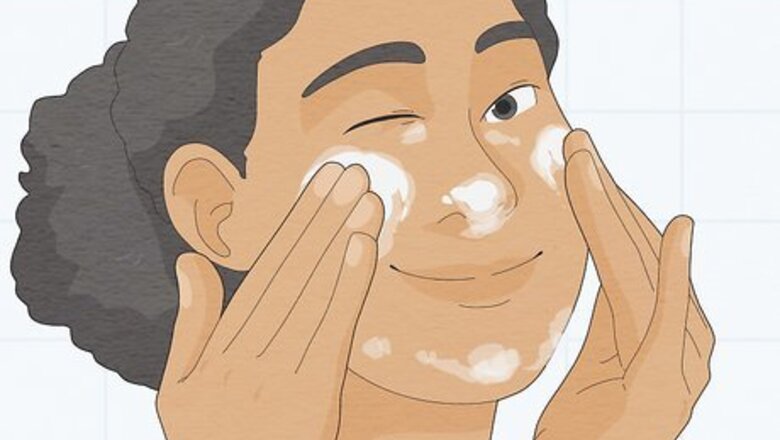
views
Finding a Good Daily Routine
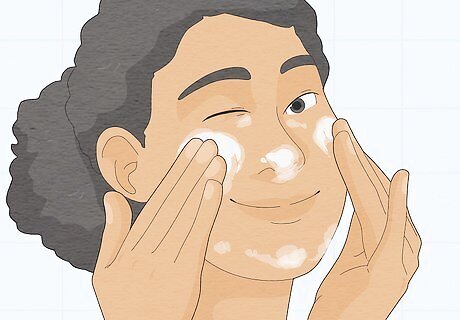
Wash your face. You can improve your facial skin by taking good care of it every day. Get in the habit of making skin care part of your daily routine. You should wash your face in the morning and in the evening and after sweating heavily. Use a gentle, non-abrasive, alcohol-free cleanser and warm water. Water that is too hot or too cold is not good for your skin. Use your fingertips to apply your cleanser. Do not use a washcloth, loofah, or mesh sponge, as these can irritate your skin. Resist the urge to scrub your face — always be gentle. Make sure to rinse the cleanser thoroughly from your face. Otherwise you could suffer from buildup, which can clog your pores and make your skin look dull. Pat your face dry gently but thoroughly with a soft, clean towel. Use a separate towel for your face instead of the one you (or others) use to dry your hands. You do not want to transfer germs to your face.
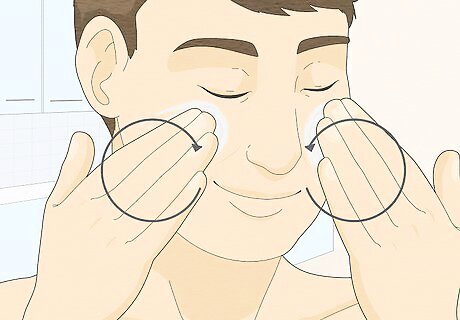
Moisturize. You should also put moisturizer on your face twice a day. Gently apply your product after you wash your face. Use gentle upward and circular strokes, especially around the delicate skin of the eye area Don't ever pull your skin down — gravity does enough of that. You should use two different moisturizers. The one you choose for daytime should include SPF production. Your nighttime cream should be a bit thicker and offer more thorough hydration.
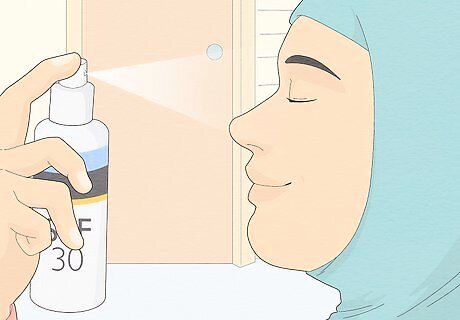
Wear sunscreen. If for some reason you cannot find a moisturizer that you like that contains SPF, make sure to apply sunscreen separately to your face. You need to do this every single day, not just when you're planning to spend a lot of time outside. The sun can damage your skin with just a little bit of exposure — even from behind the clouds. A good method is to put your moisturizer and make-up on as usual. Then apply a sunscreen that is specially formulated for your face. Look for one that is a spray mist, rather than a lotion. This will make application easy and will not mess up your make-up.
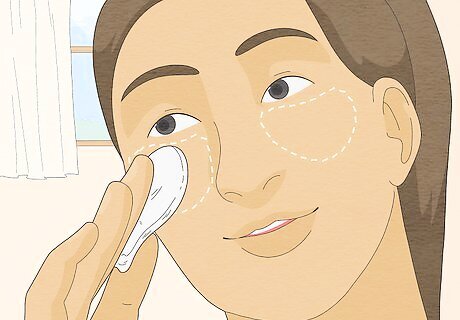
Find the right products. Your skin is unique, so you need to find products that will work best for your specific skin type. Examine your skin and try to determine if your skin is normal, oily, dry, or a combination of dry and oily. If your skin is sensitive (easily irritated), you'll want to look for cleansers and moisturizers that are specially formulated to be more gentle on skin. If your skin is on the dry side, you will notice that it flakes or cracks easily. Oily skin typically looks very shiny and you will notice your make-up does not stay in place for long. Combination skin means that you have different problem areas — usually your skin will be oily in your "T" zone (your forehead and down the center of your face, including your nose) and dry on the rest of your face. If you have dry skin, use a gentle or creamy cleanser. Those with oily skin should use oil-free, non-comedogenic foaming cleansers that contain salicylic acid or benzoyl peroxide to fight acne. If you're unsure which products to use, talk to your dermatologist or cosmetologist at a beauty supply store or department store. Those with dry skin should use moisturizers that are labeled as creams or ointments. Those with oily skin should use lotions, as these are lighter and contain more water. Ask for some product samples so that you can try a few different things before making a commitment.
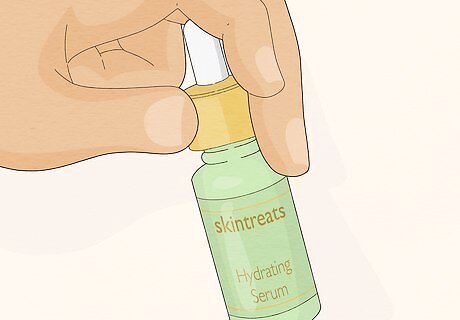
Personalize your routine. You might also consider adding a serum as a step in your skin care regimen. Serums are problem-specific, so you can look for one to help smooth your skin, or to brighten it, for example. Apply small amounts of liquid serum before you apply your moisturizer. Ask for samples of serums, too. You might also consider a toner, which can help balance the chemicals in your skin. Toners often come in the form of a spray, and are applied after you apply moisturizer and serum. Finding a good, gentle exfoliant can also help improve your skin. An exfoliating scrub can help your skin appear more radiant and glowing. Some people exfoliate once a day, while others find once a week works best for them. Try some variations (and different scrubs) to find what makes your skin look best.
Fixing Common Problems
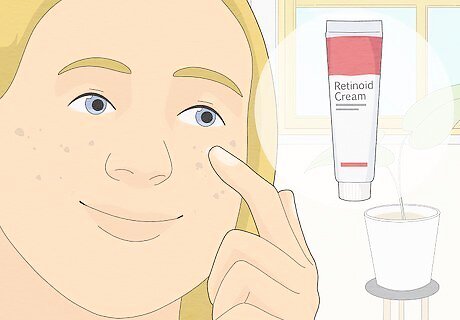
Fix dark spots. Dark spots, or discolorations, are one of the most common facial skin problems that people deal with. You want your skin to look even, so it's troublesome to deal with dark spots. Fortunately, there are ways to fix them. For spots, you'll need to add a spot treatment to your nightly skin care regimen. Each evening, dab a skin-correcting product to the discolored spots on your face. For dark spots, look for products that contain a retinoid. This chemical contains a lot of vitamin A, which will speed the correction of your problem areas.

Reduce wrinkles. Wrinkles trouble many people, especially as they age. There are many products that can help reduce the appearance of fine lines, so be sure to ask your dermatologist or a skincare specialist for a recommendation. There are also some tips you can try that don't require products. For example, try sleeping on your back. This reduces pressure (and the formation of wrinkles) on your face. Fine lines are very common around the eyes. One way to take care of these are to avoid squinting. Get some reading glasses if you find yourself straining to see. Also, make sure to wear sunglasses when you are out and about.
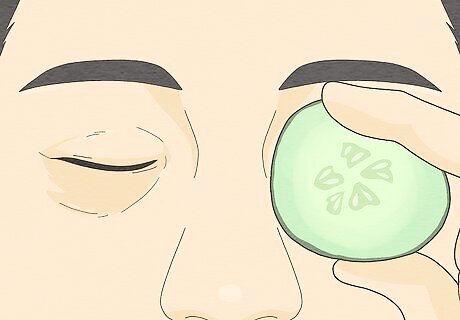
Heal puffy eyes. Tired, puffy eyes are caused by a lot of things: crying, lack of sleep, allergies. Fortunately, there are also a lot of remedies for this common facial skin problem, and many of them are easy to do at home. For example, try cold spoons. Put a few metal spoons in your fridge and let them cool for about five or six minutes. Lay down and press the rounded side of the spoon (the side that does not hold food) to your eyelids until it becomes room temperature. Bonus: it also feels very refreshing! You can also use the same method with chilled sliced cucumbers. Rest the slices on your eyes for 10 minutes. Repeat with freshly chilled cucumbers as necessary.
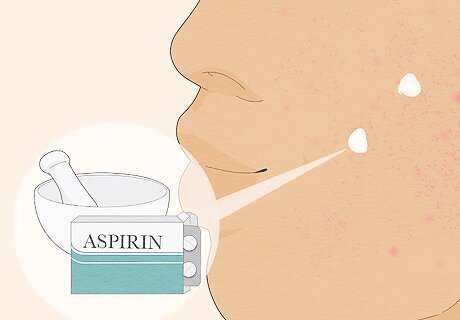
Treat blemishes. Pimples (or zits) are probably the number one facial skin complaint. When faced with a blemish, you should definitely avoid picking at it — that will only cause inflammation and possibly infection. Instead, try a dermatologist-recommended home remedy. Take one tablet of aspirin and crush it. Add a bit of water to make a paste. Apply the paste to your blemish, using a cotton swab. Let it sit for 10 minutes, then rinse with warm water. Another simple remedy is to hold an ice cube on your pimple. This will reduce swelling and inflammation. Hold in place for about five minutes, or until the ice begins to melt. Wipe some fresh lemon juice on your pimple and leave it there overnight. The acid in lemon juice makes it an excellent astringent, which can treat your blemish.
Making Lifestyle Changes

Eat right. Your diet is the component of your lifestyle that might actually have the most impact on your facial skin. Making sure that you eat right is good for you physically and mentally, and it can drastically improve the feel and appearance of your complexion. There are several foods to make sure that you are eating in order to help your skin flourish. Eat your produce. Making sure that you get the suggested five to seven daily servings of fruits and veggies is important for your skin. Fruits and veggies contain a lot of vitamins and antioxidants that your skin needs to thrive. In addition to greens, add some sweet potato and citrus to your diet. Healthy fats help your skin stay supple and smooth. Try adding in some extra fish and avocado when you are doing your meal planning. There are also many foods that have negative affects on your skin. Try to avoid eating too much salt or foods that are very greasy.
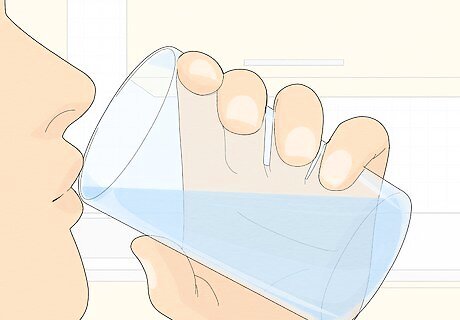
Stay hydrated. Drinking enough water is important for your overall health, and it is also crucial to keeping your facial skin healthy. You need to drink at least nine 8-oz glasses if you're a woman, and 13 glasses of water per day if you're a man. Aim for more if you workout a lot and lose a lot of water through sweat. Track how much you are drinking. Many people don't realize that they are not drinking enough water. Try making a notation every time you down 8-oz. There are also apps you can put on your phone to track your hydration. Be aware that fluids consumed through foods, like watermelon, count toward your daily water intake. Even water found in drinks like coffee, tea, milk, and juice count — just make sure you're focusing on consuming mostly water.

Get some rest. Lack of sleep has some very damaging affects on your skin. If you are not getting enough rest, your face will show it. Lack of sleep can increase the aging problem and also make existing facial skin problems even worse. Try to get between seven and nine hours of sleep per night. If you have trouble sleeping, there are some things to try. Shut down all electronics (including your phone) an hour before you go to bed. Your brain needs time to relax, and the blue light emitted by electronic devices can interfere with the production of the hormones that make you sleepy. Also, avoid eating a large meal less than two hours before you plan to go to bed.

Be active. Good news! Your trips to the gym are also good for your skin. Research shows that not only does exercise slow the aging process, but it can actually reverse its effects on your skin. So to improve your skin, get moving. Just be sure you wash your face after sweating! If you don't like going to the gym, there are plenty of other ways to add exercise into your life. Grab a friend and go for a long walk. You can also try some online exercise programs or download an app on your phone.

Learn about other sources of damage. To help continually improve your skin, it is important to be aware of the factors that cause damage. Skin damage is most typically caused by the sun, other weather (think wind), and air pollution. You may also cause damage to our skin by exposing it to dirty surfaces, such as pillowcases and your phone. Protect your skin by always wearing sunscreen when you are outdoors. You should also avoid tanning beds, as they can cause skin to age and increase your risk of deadly skin cancers. Smoking (and secondhand smoke) can seriously damage your skin. Avoid being in areas where smoke is prevalent and if you smoke — quit.
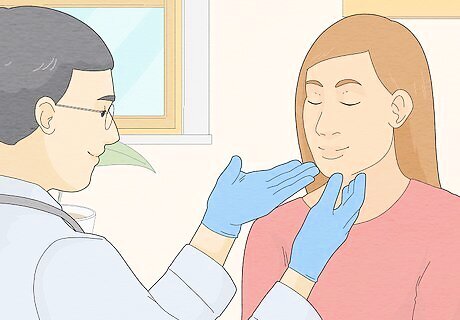
See a dermatologist. A dermatologist is a doctor who specializes in caring for skin. If you have any serious issues, you should consult one. A dermatologist can provide you with prescription treatments for many common ailments. Checking in with a professional is also a great way to learn how to prevent serious problems such as skin cancer.




















Comments
0 comment